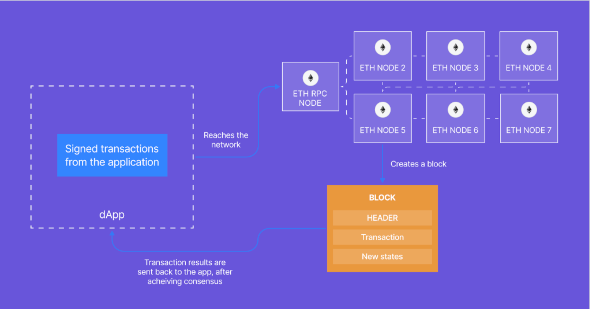Connecting Ethereum RPC with BSC and Beyond
With many ready-made blockchain infrastructure solutions in the market, Web3 developers are getting the advantage of launching blockchain-based applications in no time. Yet, before going fully in, let’s explain some nodes, that connect users to various blockchains via application interfaces.
Enter Ethereum RPC and BSC RPC – prime examples of infrastructure that collectively support numerous decentralized applications (dApps).
RPC Nodes: The Gateway to Blockchain Interaction
Decentralized applications (dApps), central entities of the cryptocurrency realm, depend extensively on data sourced from various cryptocurrency networks to promptly address user requests.
However, to seamlessly integrate with the broader ecosystem, these applications necessitate a bridge. This connection is established through blockchain nodes equipped with Remote Procedure Call capabilities.
Take Ethereum RPC, for example. It empowers Web3 applications hosted on the respective chain to seamlessly interact with the entire network. Additionally, it opens up access to the ledger for users through the application interface so that end users engaging with the dApp enjoy a smoother experience, courtesy of nodes.

Types of RPC Nodes
To better understand the concept, let’s explore the diverse landscape of nodes, where two distinctive types come into play:
1. Public Remote Procedure Call endpoints are often maintained by blockchain developers, extending their availability to all users. However, the cost-free nature of these nodes comes with a trade-off. Public BSC RPC nodes, for example, are equipped with rate limits, making them less suitable for high-performance, production-grade applications.
2. Private RPCs are reserved for specific users, projects, or dApps, which serve as a remedy for issues stemming from request congestion. Thus, private servers are the preferred choice for ecosystem developers aiming to enhance user experience by minimizing delays and optimizing performance.
In summary, private Remote Procedure Call nodes offer a more controlled and secure environment for accessing blockchain data and executing operations.
This feature is especially valuable when the project necessitates supporting several blockchains and needs to connect to BSC or Ethereum RPC to offer users a desired service or product. They are a popular choice for projects requiring high levels of customization, security, and community support.
What is BSC RPC?
BNB Smart Chain distinguishes itself by offering enhanced functionality and utility for developers in several key ways. The incorporation of smart contract capabilities, coupled with seamless interoperability with the Ethereum Virtual Machine (EVM), further bolsters its capabilities in this regard.
BSC RPC is easily accessible via a service like GetBlock. By choosing between shared and dedicated node options, users can easily make use of BNB Smart Chain’s test- and main networks.
Shared nodes are a great choice for supercharging the development of a new dApp, especially for a beginner or a smaller-budget project. Besides, you can test out your web3 product under realistic blockchain conditions by benefiting from GetBlock’s 40,000 free daily requests.
However, for clients seeking customized infrastructure configurations, a dedicated BSC RPC node is the preferred choice. With this option, users gain access to the BSC mainnet API, ensuring seamless and cost-efficient connectivity.
Users have the flexibility to select their preferred API method, whether it be JSON RPC or WebSockets. Additionally, round-the-clock online technical support is available to address any inquiries or concerns.
What is Ethereum RPC
Ethereum has established itself as the premier platform for creating and trading digital assets, evident through the vast array of DeFi and NFT applications built on its blockchain.
Given the protocol’s central role in powering transformative technologies, Ethereum nodes serve as indispensable resources for developers seeking to contribute to this thriving and growing ecosystem.
GetBlock users can also opt for the shared node infrastructure or request a privately designed Ethereum RPC node. It has never been easier to kickstart a decentralized application development with GetBlock APIs, ready to be integrated into any project with a click.
Bottom Line
With the support of infrastructure services, developers can seamlessly connect their applications to RPC nodes, accelerating the development and deployment processes.
Beyond BSC and Ethereum, GetBlock extends its services to various blockchain networks, including Solana, Cosmos, Layer-2 solutions, and newly emerging networks, totaling over 50 chains. This broad support makes it a valuable resource for developers who need to work with multiple blockchain platforms, offering convenience and flexibility in their development journey.